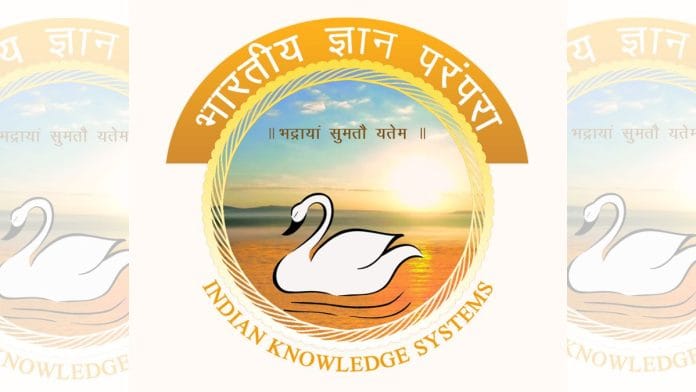New Delhi: The Indian Knowledge Systems division of the Union Ministry of Education is set to launch a new scheme to involve and acknowledge experts, who, according to the division, have remained “neglected” by mainstream academia, to study “rare and unpublished” manuscripts from ancient India, ThePrint has learnt.
The programme named “IKS Vidvan” will help these experts study, edit and publish the texts in “non-spiritual” areas—science, agriculture, animal health, civil engineering and architecture, among others.
The IKS division—called Bhāratīya Jñāna Paramparā Vibhāga, launched in 2020 in line with the National Education Policy (NEP) 2020—aims to promote interdisciplinary and transdisciplinary research on aspects of indigenous knowledge. It runs research programmes, and funds centres to foster research in IKS areas and develop study material in ancient Indian knowledge.
IKS national coordinator Ganti S. Murthy told ThePrint that the upcoming programme is meant to advance the goals of NEP 2020, which promotes ancient Indian themes.
He noted that the initiative seeks to leverage the expertise of prominent figures in the IKS field, who have been “unfortunately ignored” by mainstream academia for too long, and use their knowledge for the betterment of the nation.
Murthy explained: “95 percent of manuscripts related to ancient Indian knowledge remain unexplored by mainstream scholars, with only five percent catalogued so far. We essentially have no idea what exists within that 95 percent. This situation mirrors a challenge in science today: we understand only about five percent of the universe, while the remaining 95 percent—comprising dark matter and dark energy—remains a mystery. Yet, it influences everything around us. Similarly, the vast majority of manuscripts in Indian knowledge systems are yet to be examined.”
Beyond spiritual texts
According to Murthy, many unpublished or rare manuscripts can be found in a variety of repositories, including private collections, government libraries and individual libraries. Notably, he pointed out, the majority of these texts are not of spiritual nature, but pertain to diverse fields of study.
For example, in the realm of civil engineering, there are significant manuscripts, such as Mayamatam and Samarangana Sutradhara, both authored by the renowned Raja Bhoja.
He also mentioned that there is a rare unpublished manuscript written in the Meitei language that addresses bamboo architecture, which could be invaluable for civil engineers looking to explore innovative building techniques.
In the field of agriculture, Murthy highlighted several essential texts, including Krishi-Parashara, dating back 2,000-2,500 years, as well as the Bṛhat Saṃhitā, an expansive encyclopaedia of knowledge, and Van Vinoda.
He specifically mentioned Vrikshayurveda, an ancient Indian treatise focused on the science of plant life, and promoting healthy plant growth and productivity. “While the Sanskrit edition of this text is merely 70-80 pages long, the Odia version, spanning 400 pages, remains unpublished and unedited,” he said.
Murthy further emphasised the importance of making these texts accessible to a wider audience. “If we want people to engage with this wealth of knowledge, it first needs to be made available through critical editions.”
He also pointed out the crucial role of dedicated scholars who devote their lives to this work, saying, “We will bring on board these scholars, who already have knowledge of IKS, and will assist them in publishing these invaluable resources.”
The division will soon constitute an expert committee to nominate the scholars. “Details of the scheme and the committee will be released soon,” he told ThePrint.
Bridging gap between Gurukul system & mainstream academia
The division is set to introduce another initiative called “IKS Setubandha”, which translates to constructing a bridge. This programme aims to address the significant disconnect between the traditional Gurukul education system and contemporary mainstream academia in India. There are various Gurukuls in India that impart vedic and puranic education to students.
“There are outstanding scholars emerging from the traditional Gurukul education system, who find themselves isolated from the broader academic community. The Setubandha scheme is designed to bridge this divide by providing fellowships, specifically for students who have been educated in these traditional settings. This will enable them to collaborate and engage with established academics in mainstream institutions,” Murthy said.
Through the Setubandha initiative, the IKS division seeks to recognise the value of Gurukul education, and create pathways for these scholars to contribute to and benefit from contemporary academic discourse. “By fostering collaboration between these two educational spheres, the programme aspires to enrich both the traditional and modern knowledge landscapes in India,” he added.
The division will soon invite applications from students of traditional schools to apply for the scheme.
Murthy pointed out that, currently, there is no established practice of publishing research papers within the traditional education system. The Setubandha scheme will attempt to change this by offering students an opportunity to learn the necessary skills for academic publishing.
“We can continually assert that the Indian knowledge system is exceptional, but if we don’t share this knowledge with the wider world, who will recognise its value?” Murthy said. “While we can take pride in our heritage, that pride needs to be grounded in tangible evidence. We want to create a solid foundation for these scholars to showcase their work and demonstrate the richness of their knowledge.”
(Edited by Mannat Chugh)






